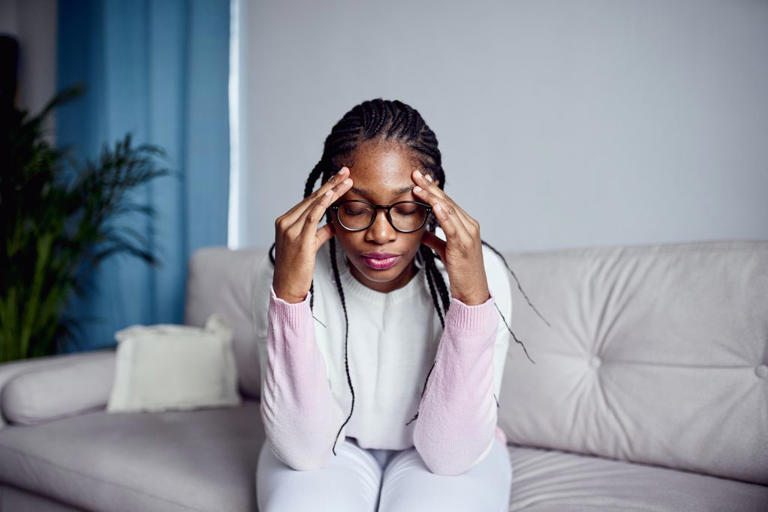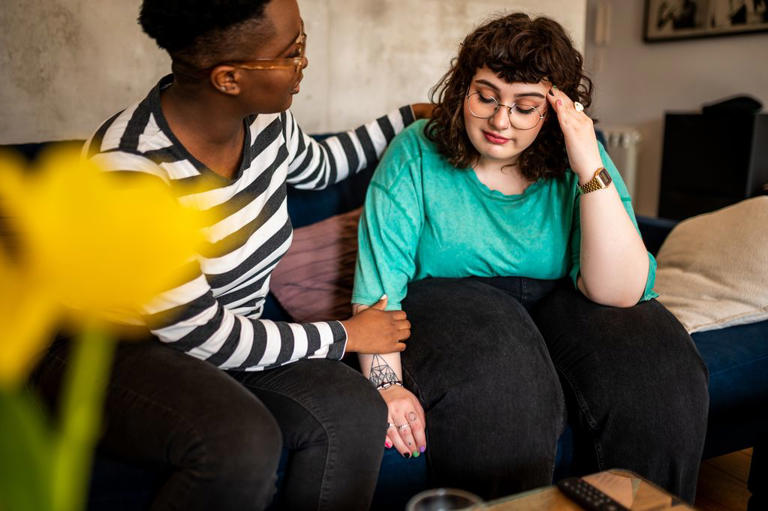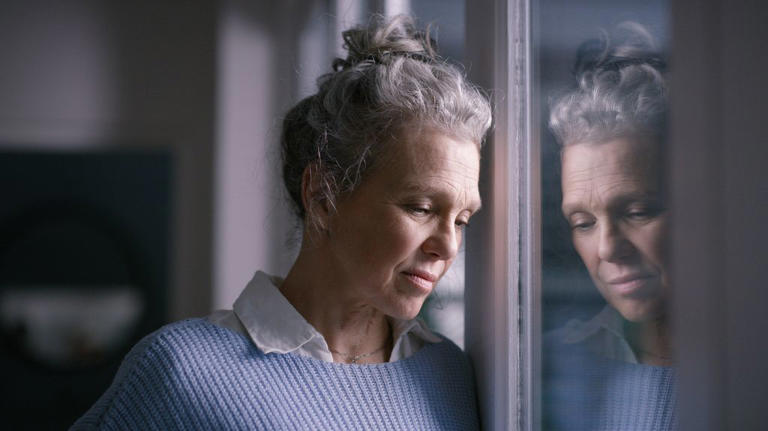WHAT THERAPISTS WANT YOU TO KNOW ABOUT GRIEF













What therapists want you to know about grief
It's an upsetting thought that at some point, all of us will be impacted by grief. Whether it's the loss of a loved one, the passing of a pet or having to say farewell to a close friend, grief hits us all differently and can leave many of us feeling lost and alone.
In honour of Grief Awareness Week, we spoke to BACP-accredited therapists about the one thing they want their clients to know about grief. We hope it brings comfort to anyone struggling this week.
1. You will get through it
"It’s hard to believe when you first suffer a loss that you will ever recover but please believe me when I say that you will," urges integrative counsellor and psychotherapist Lulu Sinclair, who specialises in grief, loss and trauma.
"We all experience grief individually and differently so, while I can’t say exactly how you will experience it, I can speak from my own experience and those of others I have helped through their loss.
"After the numbness and initial disbelief may come the indescribable pain and misery that you fear will never stop. It will. The anguish and waves of despair that wash over you when you begin your grieving will recede over time with each wave being slightly less powerful than the last.
"There is no shortcut to the emotions – including anger – you may feel but these too will lessen. Don’t rush, don’t make any sudden life-changing moves and don’t worry about other people and how they may think you 'should' be managing it. You know you best.
"It takes around two years to come through the loss of someone for whom you cared deeply. You may feel different but you will get through it. And please remember that you do not have to leave behind those who are gone, you can carry them always with you in your heart."
2. There is no "right" or "wrong" way to grieve
"It's important to understand that grief is a natural and individual process," says senior accredited BACP psychotherapist Andy Garland.
"Grief can manifest differently for each person, and there is no "right" or "wrong" way to grieve. It can be a complex journey that involves a range of emotions and this may take time. Grief isn’t something to be rushed; it's about finding ways to heal and adapt to loss in your own time and a way that works for you."
Bereavement counsellor Sara Matthews agrees, adding: "Many people feel they are doing grief wrong. When people are doing their best to get on with life, they feel guilty they are not sad enough. When they feel sad, they feel wrong for not coping very well.
"There’s a self-consciousness to grief that causes people to worry it’s lasting too long or if they seem okay that others will think they don’t care. Grief is hard enough without the rules we impose on ourselves about how we feel and what we need."
3. Our mind will reprioritise grief
"I often share with my clients that the actual grief doesn’t change, which can be a scary thought," says Andy Garland. "What does change is the life and experiences that surround and grow after grieving begins. This means that our mind establishes a new priority for dealing with the trauma and grief.
"It’s a little like automated mindfulness – our thoughts are directed to the most immediate and current experience. So, we get to choose our thoughts and feelings whilst honouring the grief from a more healthy perspective."
4. Feelings often don't fade
"The idea that we must 'get over' our grief still prevails for many people," says Sara. "But a grieving parent won’t stop loving their child simply because they have died. Love lives on.
"And sometimes other less positive feelings, such as anger and hurt can also remain.
5. Grief can get worse before it gets better
"When someone first dies, we will feel shocked – even if the death has been anticipated, after a long illness for example," explains Sara.
"Death is always shocking and shock has its uses. It protects us from the worst of our pain. It allows us to do what we need to do in the immediate aftermath of a bereavement. Gradually shock begins to wear off and then our pain can feel as if it’s getting worse.
"What’s really happening is that we are increasingly more aware of the full extent of our feelings which is why it can feel like things are getting worse."
6. Grieving looks different to different cultures
"It's important to realise that how someone responds to grief may be informed by their cultural and religious beliefs," says psychotherapist Bhavna Raithatha.
"In some cultures, there will be clear periods of mourning either before or after their loved one has been laid to rest or cremated.
INSPIRATION: How nature helped me reconnect with myself after my parents died
"There will be rituals with prescribed dress codes and a limiting or stopping of certain social activities such as going out, attending parties or weddings or any form of celebration during the mourning period.
"In other cultures, there is clear frowning on displays of emotions and the whole process of death is sanitised and dealt with formally. The important thing to remember is that how we respond to grief is a very personal matter regardless of customs and rules and people should deal with grief in whatever way feels appropriate as long as they are not at risk of harm to themselves or others."
7. Tea can help!
"Crying makes you dehydrated. So sometimes a nice cup of tea can be genuinely helpful," adds Sara.
Articles - Latest
- Earthquakes can trigger quartz into forming giant gold nuggets, study finds
- Linda Nolan, singer and television personality, dies aged 65
- Sly Stone, pioneering funk and soul musician, dies aged 82
- Dangers of an overloaded car include:
- Natural Disaster today
- Japan earthquake: Kushiro shakes for 'too long' as 6.1 mag tremor hits
- 'Cult' members jailed over coroner kidnap plot
- Flood risk threatens Swiss valley after glacier destroys village
- Thailand Grapples with Floods and Economic Shifts: Government Response, Community Resilience, and Market Predictions
- Powerful hailstorm floods buildings and streets in Gniezno
- The Significance of the 49-Day Journey After Death
- Killing prisoners for transplants: Forced organ harvesting in China
- Southern Japan hit by 6.6-magnitude quake near Nankai Trough, tsunami warnings lifted
- Peru’s coastline battered by tsunami-like waves one day after country declares environmental emergency
- California fires live updates: ‘Dangerous’ winds return as residents are warned over threat of new wildfires
- Osibisa founding member and singer Teddy Osei dead at 88
- Oliviero Toscani, photographer behind shock Benetton ads, dead at 82
- California LA Mayor Karen Bass awkwardly ignores questions from reporter about California fires
- UK set for more freezing weather as homes and businesses deal with flooding
- Jean-Marie Le Pen dead at 96: His political career through the years
- Jimmy Carter, former US president, dies aged 100
- ‘Jazz’s most significant composer’ Benny Golson dies at 95
- Billionaire founder of fashion chain Mango dies in accident
Articles - Most Read
- Main
- Contact Us
- The science behind Ouija boards
- Cosmic Consciousness - What is Cosmic Consciousness-2
- Cosmic Consciousness - Introduction-2
- Cosmic Consciousness-Introduction
- MASSIVE 6.1 MAGNITUDE EARTHQUAKE HITS NEW ZEALAND AS NATION STILL REELING FROM CYCLONE
- ARCHAEOLOGISTS UNRAVEL THE TRUTH OF APHRODITE, GODDESS OF LOVE, ON VALENTINE'S DAY
- Cosmic Consciousness First Words - 1V - 2
- The Human Condition-Thomas Keating
- Cosmic Consciousness First Words - V -
- Cosmic Consciousness V - 2
- Shakyamuni Buddha or India the 1st “Black Revolutionary Hero.”
- Cosmic consciousness - First Words - IV
- Cosmic Consciousness - What is Cosmic Consciousness?
- The Human Condition-2-Thomas Keating
- Evolution and Devolution-Chapter 2
- The Human Condition - Thomas keating-3
- Drinking From The Mountain Stream - Milarepa
- Cosmic Consciousness-On the Plane of Self Consciousness
- The Human Condition - 4
- Cosmic Consciousness - 3 - On the Plane of Self Consciousness
- The Human Condition - 6
- Evolution and Devolution-Chapter 1
- The Buddhist System of Liberation - 2
- Contemplation and the Divine Therapy - 2
- On the Plane of Self Consciousness - 2
- Milarepa's World-2
- The Human Condition - 5
- On the Plane of Self Consciousness IV
- Milarepa's World
- On the Plane of Self Consciousness IV - 2
- The Buddhist System of Liberation
- JERRY RAWLINGS, GHANAIAN STRONG MAN WHO CAME TO POWER IN A COUP BUT INTRODUCED DEMOCRACY – OBITUARY







